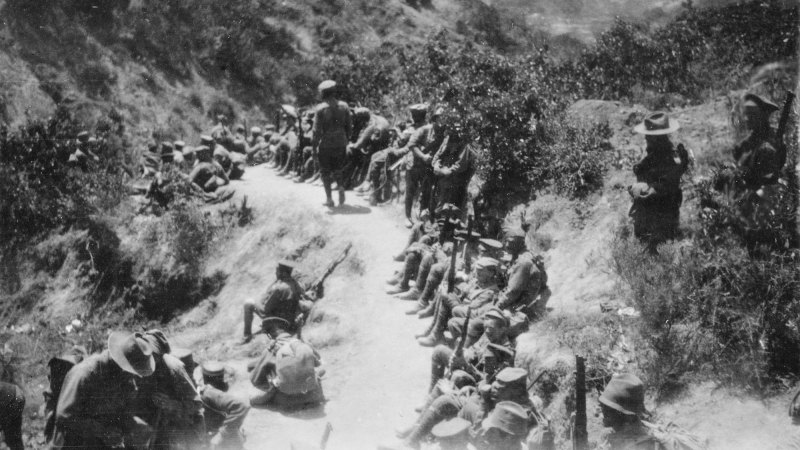Save articles for later
Add articles to your saved list and come back to them any time.
First published in The Age on April 26, 1923
A DAY OF MEMORIES
Pride in the Glory of Anzac’s Youthful Heroes
WHOLE NATION STANDS STILL IN SILENT TRIBUTE
Australian troops rest in one of the gullies leading up to the front line. Photograph by Age correspondent Phillip Schuler. Credit: Australian War Memorial, PS1676
As a mother on the anniversary of her son’s death turns back her thoughts over years and mourns for the boy she has lost, so Australia, the nation, paused yesterday and thought in sorrow and pride of her gallant sons who died on Gallipoli’s shore eight years ago. By their fearless and wonderful deeds in the face of terrible odds, those sons had proclaimed Australia a nation.
Resting in the trenches in the Anzac area. Photograph by Age correspondent Phillip Schuler.Credit: Australian War Memorial, PS1517
It was a nation of sorrowing mothers, fathers, brothers, sisters and sweethearts, whose pride in the glory of the youthful heroes of Anzac was overshadowed by grief. Time, with its healing balm, has softened the grief, but it has not obliterated the memory of the Anzacs brave deeds, or the young nation’s pride in the valour and achievements of her fallen sons.
There was nothing spectacular in the Anzac commemorations in Melbourne yesterday. The day was proclaimed a public holiday, but it was not as other holidays. There was no rejoicing. Memories of the young heroes who went away and never returned were still fresh and vivid.
Crowds flocked into the city, but they were quiet and subdued crowds. Halls and churches in which memorial services were held were all thronged with men and women who obviously had lost loved ones in the war. Flags waved from trams and over high buildings, but there was nothing else to indicate that the city was celebrating the greatest event in Australia’s history. At least, that was the impression until the clocks pointed to the hour of 11. Then a great change came over the city.
The two-minute silence, which has come to be a feature of the Anzac day commemoration, began with the striking of the eleventh hour. The great street crowds, as if actuated by one common spirit, suddenly stood still. Trams, motor cars and all other vehicles ceased running. Conversations died away on the lips of the citizens, as men bared their heads and stood motionless, and policemen on point duty held up their hands as a signal for total silence while the sacred two minutes passed – the two minutes in which, eight years ago, Australian soldiers plunged into the greatest war in history.
In that brief interval of silence the thoughts of half a million citizens went over the oceans to the son, brothers, husbands and lovers who lie today under little wooden crosses on the foreign soils where they fought and died for the honour and freedom of those they left at home.
That brief interval of silence was more eloquent than the greatest orator who ever spoke, and more impressive than the grandest ceremony. People could not but remember and mourn the dead heroes of Gallipoli, and honour those who came through the terrible campaign alive.
At two minutes past eleven the constables on point duty dropped their hands and the city crowds went again on their busy, noisy way. Some at least, in all that throng must have recalled the words of a little known Australian poet:
The morning sun, in gladsome ray,
Shall see those loving me no more;
Fond hearts are full of grief today,
But still the earth rolls on its way;
As heedless as before.
The earth rolls on, but yesterday Australia did not forget.
Most Viewed in National
From our partners
Source: Read Full Article



